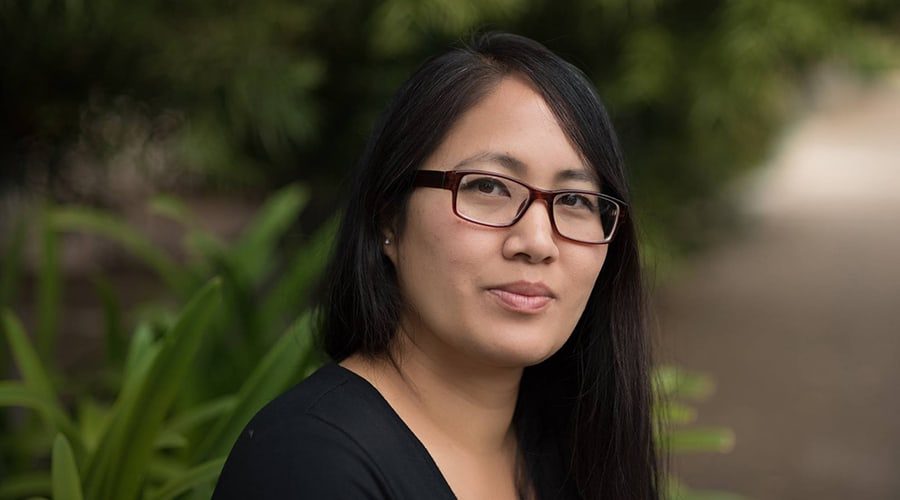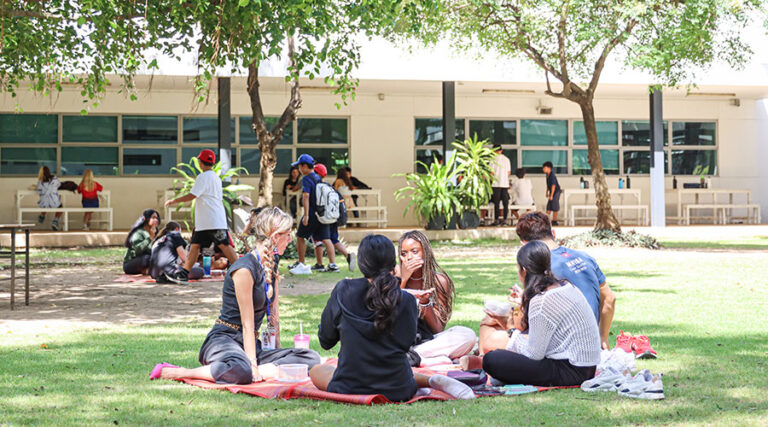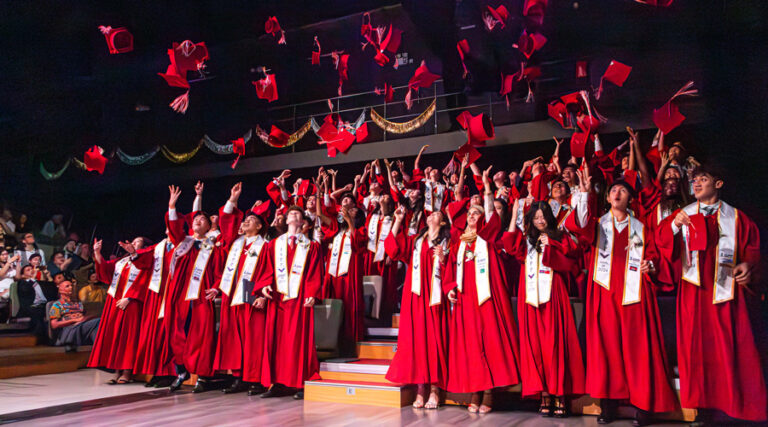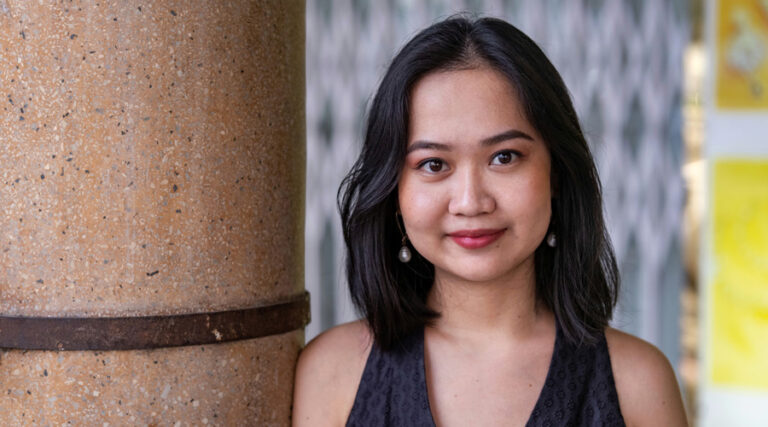Alumni Interview: Visakha Som
Class of 1997 | Years at ISPP 1991 – 1996
My name is Visakha Som and I am happy to share a bit about myself and how ISPP has impacted my life.
I was born in 1979 and spent the first 11 years of my life in the U.S., oblivious to the war or even why my family fled Cambodia in 1975. When I arrived in Cambodia in 1991 to live with my mom, I was not prepared for the mosquitos, the heat, and the civil unrest and was suddenly plunged into a world I knew nothing about.
ISPP changed that for me. At the time, ISPP was just a tiny school with about 30 students located near Wat Phnom. Another student and I were the first 7th graders and honestly, I have no idea how the amazing teachers and administrators managed to create and find curricula for us, which they continued to do for the next five years (I was part of the first 7th-grade class, 8th-grade class, etc. until 11th grade). Each year, I somehow managed to get a rich education. One major thing that ISPP taught me is to be aware of my privilege and how to use that to help others. The hours spent hanging out and playing with orphans and street children and recognizing my privileges truly have led me to my current path.
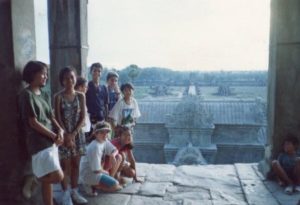
Fast forward to 1996, I moved back to the United States and finished high school. I began school at UC Santa Cruz in 1997 and by 2000, I had dropped out, lacking direction and motivation. I spent the next nine months, working four jobs to earn enough money to visit Cambodia for the first time since I left, on my own terms and as an adult. Long story short, I came back to the US, feeling inspired and finished up a degree in Women’s Studies.
Shortly after, I began my career in nonprofit administration, spending seven years with a social and behavioural health agency that primarily served foster youth, providing administrative and quality assurance support. I later was offered a position with another nonprofit as a program manager for the Senior Nutrition program aka Meals on Wheels, which provided nutritious meals to food-insecure seniors in their homes and community settings. Over the next three years, I began to adopt more programs and became the Director of Operations for the Aging Services Division, serving close to 2000 individuals annually with a small budget, while accomplishing large improvements in service delivery and outcomes. This experience remains the most rewarding and challenging experience in my career. Unfortunately, my largest program, Meals on Wheels, lost public funding in 2014 and I found myself wondering what to do. Most of my skills and experiences were learned on the job — I had good instincts but I didn’t quite understand the science and art of managing quality efforts and running social service programs.
In 2015, I decided to embrace my nerdy self and at the age of 36, with two young kids at home, I began the Masters of Public Administration program at San Francisco State University. By 2017, I was named graduate hood (similar to summa cum laude) and published my first peer-reviewed scientific research, while working part-time as a consultant.
After six months of trying to find a full-time job in the competitive San Francisco market, I landed a job working in the state government. I spent five years there, advocating for clients to be free from harm and to be able to have self-determination in a society that has historically treated people with intellectual and developmental disabilities as less than human. My team and I disrupted the status quo in an effort to bring out true quality improvements. I learned that cultural acceptance of inaction and the status quo can only happen through the complicity of individuals and I chose not to be one of those people. I made the hard decision to resign in 2022 to pursue other opportunities that were better aligned with my values. Today, I work remotely for a nonprofit organization that actually demonstrates boldness, well-being, equity and community-centeredness. While I don’t know exactly where my next career step is, I am glad to be able to help others and have renewed hope for the future.
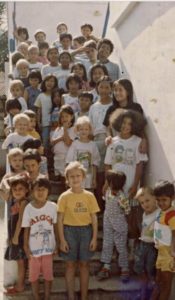
Tidbits you might find interesting:
- From 1991 to 1992, Ms Forrester taught our class of 5th, 6th and 7th graders. In total, there were eight of us and after (finally) learning about contemporary and ancient Khmer History, we went on a field trip to visit the Angkor temples at the end of the year. Imagine flying in a small plane — somehow, three of us shared two seats and one of us ended up in the luggage storage area on a chair. Once at the Angkor temples, we were stunned by the beauty and grace. We had the run of Angkor Wat — no joke, we barely saw other people and ran around amok, following the little kids who showed us the hidden secrets of Angkor Wat.
- For PE, we used to take this bus to the Olympic Stadium that didn’t have a door and Mr French would stand in the doorway, making sure that no one tumbled out. I remember watching out for rats as we stretched on the ground and cheered at basketball games for UNTAC soldiers.
- I was part of the first student body council.
- My father helped craft the first Cambodian constitution back in the early 1960s. He was one of the last surviving elders who was a keeper of Cambodian history. He passed away in 2017, having published multiple books in English, Khmer, Pali, and Sanskrit.
- My mom ran small inns and several teachers stayed with us. I think I have “lived” with at least three teachers.
I have two kids, ages 12 and 16. As of yesterday, I am officially the shortest person in my family with my 12-year-old now being 5 foot 6. For years, I towered over people in Cambodia. - My husband is mixed-race Mexican and Swedish and I am half-Khmer and half-Chinese. We chose to honour our cultural heritage with our kids’ names which makes for interesting conversations about implicit biases.
- I have to give thanks to some teachers: Thank you, Mrs Fawcett, for your steady guidance during difficult times and for welcoming me to your home decades later. Mrs McLaurin, thanks for letting me pretty much live at your house and birthing Jac McLaurin, my love-bucket/bestie. Mrs Copple, thank you for your sweet voice and for teaching us songs that I now sing to my kids. Ms Greve, thank you for caring and doing all you could do to support and protect the students. To Mr and Mrs French, thank you for helping me find joy in learning and not minding too much when the bear chased your kids around. 🙂
Visakha Som, MPA
https://www.linkedin.com/in/visakha-som/
https://portfolium.com/VisakhaSom
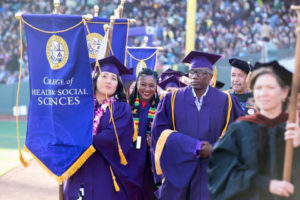
What years and grades did you attend ISPP and when did you graduate?
I attended ISPP from 1991 to 1996 for my 7th to 11th grade. I graduated in the US in 1997.
Where do you reside now? (City, Country)
I am currently living in Olympia, Washington state, in the US.
What are your hobbies? What do you end up doing in your spare time?
I am currently obsessed with succulents and spend a lot of time tending to my indoor garden.
What do you miss most about Phnom Penh?
Food! I really miss eating fresh fruit and yummy food!
How do you feel your time at ISPP contributed to where you are now?
So much! I mentioned already how ISPP and living in Cambodia have made me who I am today. I am so grateful for the rich experiences and for ISPP cultivating my curiosity and my passion to help others.
How did you figure out what you wanted to do with your life?
Honestly, I am still trying to figure it out — one thing about working with older adults is that it helped me recognize that life is long (my oldest client was 117 when he passed away) and just because you know what you want to do in five years, doesn’t mean that you can’t change your mind and evolve. When I have wondered what my next steps are, I remember that growing is sometimes uncomfortable and it requires moving from wondering to acting; acting can be scary but it’s a great way to figure out what you are capable of. Consider this for a minute — if you are reading this, then you are likely a young person who has had to adapt to so much already. If that resonates with you, then you already have the valuable skill of adaptation; that skill will take you far in life.
What are some tips for finding one’s passion if they don’t know what one wants to do in the future?
Centre and ground yourself. Ask yourself “What makes me tick?” Challenge yourself to stretch beyond what you think you are capable of. Give yourself time and grace to decide what you want to do in the future and remember that life throws things at you that can derail you completely or you can adapt and find your own path.
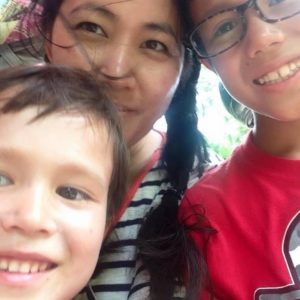
This interview was first published in the ISPP Pulse Magazine (February – April 2023).
More “Where Are They Now?” interviews:
- Yoobin Kim (2012 – 2015)
- Gaurav Raul (2005 – 2007)
- Meghan McMurray (2015 – 2017)
- Enya Pangilinan (2009 – 2012)
- Vimuolea Hang (2006 – 2013)
- Frank van Zoggel (1991 – 1993)
- Sharlynn Ng (2005 – 2010)
- Brian Webster (2002 – 2016)
- Thida Leiper (1991 – 2005)
- Armando Abrahamsson (2010 – 2012)
- Luca Fleschler, Fraya Fleschler, Ximena Herrera (2011 – 2017)
- Dany, Soriya and Kalyane Warren (1996 – 2001)
- Nadia Fernando (1999 – 2015)
- Lotta Urban (1998 – 1999)
- Sreyneath Poole (2000 – 2005)
